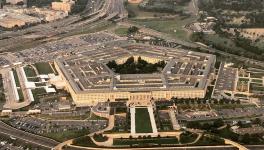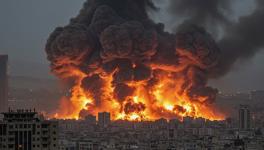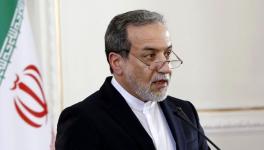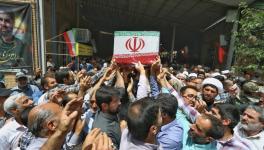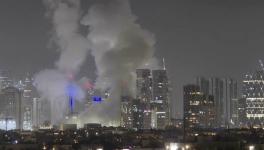Frantic Efforts on to Save Iran Nuclear Deal
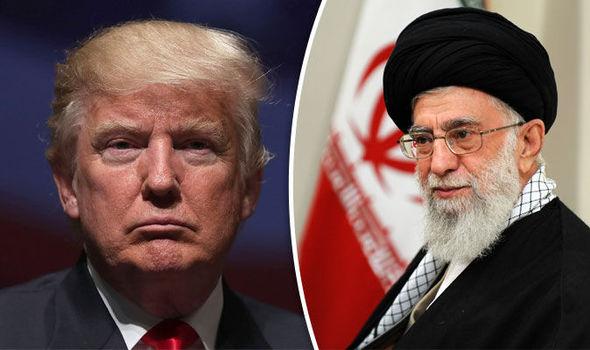
European Union and British leaders scrambled over the weekend to save the Iran nuclear deal from being sabotaged by US President Donald Trump ahead of a key deadline for the renewal of the process. According to US law, the President has to recertify the waiver of sanctions on Iran every 3 months. Trump has warned that if his amendments to the deal are not accepted by May 12, he will pull the US out of the deal by refusing to recertify the waiver.
Trump’s proposed amendments seek to restrict Iran’s role in Syria, Yemen and other parts of West Asia, apart from imposing on Iran a permanent restriction on uranium enrichment and the development of ballistic missiles.
As per the provisions of the Iranian nuclear deal signed in 2015, known as the Joint Comprehensive Plan of Action (JCPOA), the restrictions imposed on uranium enrichment by Iran are set to expire in 2025. Trump had insisted earlier this year that “these provisions must have no expiration date. My policy is to deny Iran all paths to a nuclear weapon - not just for 10 years, but forever.”
Further, while Iran had agreed for the continuation of the UN ban on the import of ballistic missile technology for up to 8 years as a part of the JCPOA, the restriction on Iran’s indigenous development of nuclear-capable ballistic missiles is “non-binding.” Trump insists on changing this in order to deny Iran the possibility of developing ballistic missiles.
Iran has rejected these proposals, and has been supported by Russia and China, two of the signatories to the deal.
"If they want to make sure that we are not after a nuclear bomb, we have said repeatedly that we are not and we will not be.... But if they want to weaken Iran and limit its influence, whether in the region or globally, Iran will fiercely resist,” Iran’s President Hassan Rouhani said on Monday in a speech broadcasted live on state television.
In a public address yesterday, Rouhani warned that if the US “wants to leave the nuclear deal, it will quickly see that this decision will be a regret of historic proportions,” adding that Iran would produce “as many facilities, weapons, missiles that are necessary for our country,” and that “it is none of others' business.”
During an hour-long telephone conversation with Rouhani, French President Emmanuel Macron reportedly told him that the original deal had to be preserved, but called for further talks to address those parts of the deal Trump was concerned about. Rouhani, on his part, has made it clear that the deal is not negotiable.
In a last-minute bid to convince Trump to not sabotage the agreement, British Foreign Secretary Boris Johnson has flown to Washington. Urging the US to not scuttle the deal, in lieu of which “Iran has placed two-thirds of its centrifuges in storage and relinquished about 95% of its uranium stockpile,” at a time when the country was only months away from producing enough weapons-grade uranium for their first bomb, Johnson said, in an op-ed in the New York Times, “I am sure of one thing: every available alternative [to JCPOA] is worse. The wisest course would be to improve the handcuffs rather than break them.”
"[O]ne must remember what could happen if this deal collapses and the Middle East begins to build up armaments," German President Frank-Walter Steinmeier warned in an interview.
However, Mike Pompeo, the newly appointed US Secretary of State, who had previously agreed with IAEA officials and the EU that Iran had not violated any terms of JCPOA, ratcheted up the anti-Iran rhetoric yesterday, calling the country the “the greatest sponsor of terrorism in the world.” Speaking at Saudi Arabia, he sought to assure his hosts, saying, “We are determined to make sure [Iran] never possesses a nuclear weapon. The Iran deal in its current form does not provide that assurance.”
Israel lobbies against deal
Meanwhile, on Friday, Israeli Prime Minister Benjamin Netanyahu, who has been a vocal critic of the deal since its inception, spoke to the Prime Ministers of Australia, India and Britain, in an attempt to persuade them to take a stand against the JCPOA, by updating them “on the important material that he revealed regarding the Iranian nuclear archive,” according to his office.
However, Netanyahu’s attempt to scuttle the deal by making a theatrical presentation of the material, reportedly obtained by Israeli intelligence from a warehouse in Iran, seems to have been less than successful. Most observers have pointed out that these archives, mostly from 1999-2003, revealed nothing that was not already documented in IAEA’s 2011 report.
The IAEA has said “the agency had no credible indications of activities in Iran [for developing] a nuclear explosive device after 2009,” Jerusalem Post reported. The EU has also maintained that Iran has been abiding with the terms of the agreement.
A more sensational revelation than the one by Netanyahu was made by the Observer, which accessed documents revealing that Trump's aides had “hired an Israeli private intelligence agency to orchestrate a ‘dirty ops’ campaign against key individuals from the Obama administration who helped negotiate the Iran nuclear deal.”
In May last year, days after Trump visited Tel Aviv, officials from his team allegedly contacted the agency to investigate the personal lives and relationships of one of Obama top national security advisers, Ben Rhodes, and Obama’s deputy assistant, Cohin Kahl, in order to “get dirt” on them.
“The idea was that people acting for Trump would discredit those who were pivotal in selling the deal, making it easier to pull out of it,” a source familiar with the details campaign has told the Guardian.
Oil prices soar
Markets have already reacted to the fear of loss of Iranian oil - which could reduce the global oil supply by 800,000 barrels per day - leading to oil prices rising above $70 per barrel for the first time in over three years.
Since the beginning of this month, Brent crude, which is a benchmark used to price two-thirds of the internationally traded crude oil prices, rose from $73.13 to $75.72 as on 5:45 p.m (IST) this evening, while West Texas Intermediate (WTI) crude rose from $67.25 to $70.52.
Since the lifting of sanctions on Iran in 2015 after the JCPOA was signed, Iran’s oil production rose from about a million barrels a day to 3.8 million barrels. A reimposition of sanctions on Iran, which may restrict its ability to export oil, can affect the global market, which is already facing an average deficit of 700,000 barrels a day, and “add a significant premium to oil prices,” according to Matt Parry, who heads long-term research at Energy Aspects, Market Watch reported.
The coming week will be vital to the future of the deal. The impact of the collapse of the agreement is likely to be felt globally and could lead to an escalation of tension in West Asia to the detriment of the people of the region. On the other hand, except for a few oil producing countries, the only players likely to benefit are Saudi Arabia and Israel, who will look to expand their influence further in the area.
Get the latest reports & analysis with people's perspective on Protests, movements & deep analytical videos, discussions of the current affairs in your Telegram app. Subscribe to NewsClick's Telegram channel & get Real-Time updates on stories, as they get published on our website.











